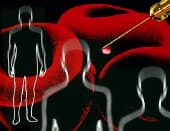One trial found gene tests help with standby med warfarin, another shows promise for newer drug
HealthDay – Not on Site

By Dennis Thompson
HealthDay Reporter
TUESDAY, Nov. 19, 2013 (HealthDay News) -- Genetic testing could help better guide doctors' use of warfarin, new research suggests. The blood-thinning medication is widely used to prevent stroke and heart attack in people with irregular heartbeats.
Warfarin is a popular medication, but a tricky one to use, the researchers said. Patients who receive too strong a dose can suffer from unusual and excessive bleeding, potentially coughing up or vomiting blood, according to the American Heart Association (AHA).
But doctors who used genetic testing to guide patients' warfarin doses were better able to quickly reach and consistently remain within the drug's therapeutic "sweet spot," according to the study. It was published in the Nov. 19 online edition of the New England Journal of Medicine and presented Tuesday at the AHA's annual meeting in Dallas.
"[Blood-thinning] therapy is difficult and it's associated with a lot of potentially harmful side effects," said Barbara Howard, a senior scientist at MedStar Health Research Institute in Hyattsville, Md. "It is important to get the dose right, and here is a potential area where genetic testing could play a valuable role." Howard, who is also a professor at Georgetown University Hospital, was not involved with the new research.
The study involved about 450 patients, approximately half of whom were randomly assigned to receive a genetic test that would guide their warfarin dose, said the study's lead author, Munir Pirmohamed, chairman of pharmacogenetics at the University of Liverpool, in England.
"Warfarin is 60 years old," Pirmohamed said. "Dwight D. Eisenhower was one of the first people to get this medication." Despite the drug's age, however, dosing guidelines haven't changed much, he said.
About three-quarters of the patients in the study suffered from atrial fibrillation, a heart rhythm disorder that increases a person's risk of heart attack and stroke by allowing blood to pool in one of the heart's chambers. The rest of the participants had deep vein thrombosis, a condition in which blood clots in veins put patients at risk for heart attack and stroke.
Doctors used two specific genes associated with the blood-clotting process to help determine the amount of medication a person would receive, Pirmohamed said.
Patients with a genetically guided warfarin dose remained within the therapeutic sweet spot for 67 percent of their three-month-long treatment, compared with 60 percent for people taking warfarin without the genetic guidance.
Patients with genetic dosing reached that sweet spot about 28 percent more quickly, Pirmohamed said. They also were able to begin a stable long-term dose about 25 percent more quickly. In addition, they required 9 percent fewer dose adjustments.
The researchers used a limited genetic test that costs about $67.
A U.S. expert said genetic testing is likely to become much more useful in determining drug dosage in the future, given that the costs of such tests are falling.
source : Studies Suggest Better Approaches to Staying Clot-Free








